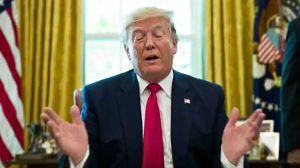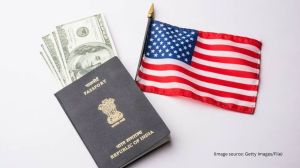Day after, India gives it back to Boucher
As the US returned to a glaring hyphenation of the sub-continent, calling on India and Pakistan to exercise nuclear and missile restraint an...

As the US returned to a glaring hyphenation of the sub-continent, calling on India and Pakistan to exercise nuclear and missile restraint and return to dialogue, the Foreign Office responded today by lashing out at the gratuitous ‘‘clutter’’ of US State Department spokesperson Richard Boucher’s remarks with ‘‘unwarranted references’’ to New Delhi.
Asked about Pakistan’s decision to test a series of ballistic missiles, Boucher on Tuesday voluntarily went on to offer advice to India and Pakistan to begin a dialogue on confidence-building measures which, he said, ‘‘could be part of a broader engagement to reduce tensions’’.
|
Shun supporters of teror:
Advani doesn’t miss Pakistan |
|
NEW DELHI, OCTOBER 15 |
Though Boucher did not directly name India, his inference was more than obvious. ‘‘We urge Pakistan and other countries in the region to take steps to restrain their nuclear weapons and missile programme, including the operational deployment of nuclear-armed ballistic missiles,’’ he said.
By evening, Foreign Office spokesperson Navtej Sarna had his response ready: ‘‘We are surprised at the manner in which the US State Department spokesman has chosen to respond to a question on the Pakistani missile test. He ought to have confined himself to reacting to the Pakistani missile test rather than cluttering up what he had to say by thinly disguised unwarranted references to India,’’ he said.
Analysts here argued that the US spokesman’s language reflected the ‘‘continuing strength of the non-proliferation lobby’’ in the establishment which sought to spread concern that the sub-continent was permanently teetering on the edge of a ‘‘nuclear flashpoint’’. What seems to have really angered New Delhi was Boucher’s insistence on dragging India, again and again, into the Pakistani hyphen. Even when the journalist asking the question (‘‘excuse me, I’m asking about Pakistan’’) wanted a direct response on the Pakistani missile test, Boucher wouldn’t relent. ‘‘As you know both sides have tested missiles,’’ he said, repeating himself.
Photos




- 01
- 02
- 03
- 04
- 05



























